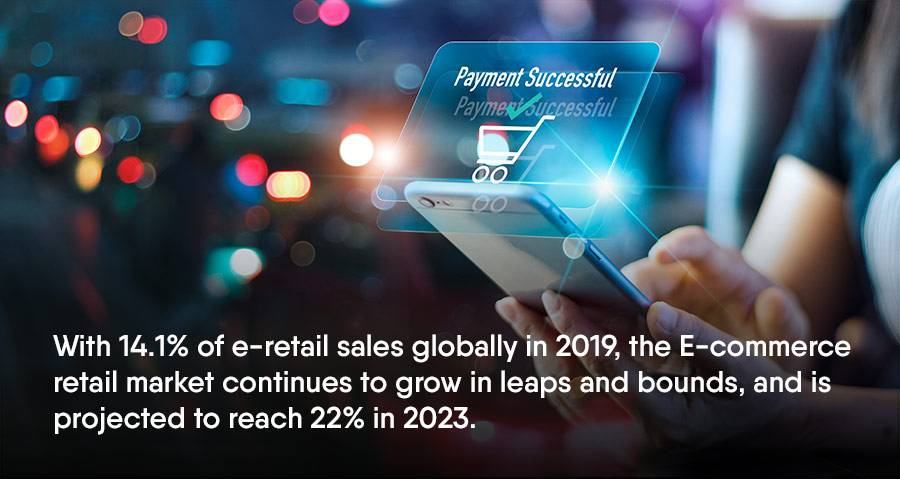Technical Skills for Success in E-commerce Retail
For the longest time, workers in the retail industry have been lumped into an ‘unskilled’ category. Since — let’s face it — technical know-how is hardly needed to stock shelves or welcome customers as they troop in or scan products at checkout.
E-commerce presents a new world of benefits to business owners, as you’re able to defy geographical boundaries, increasing brand visibility and appeal, and you get to close sales digitally, which helps you spend far less on rent and maintenance costs.

That being said, the world of e-retail is diverse, nuanced, and more complex than meets the eye. It demands more than mere book-keeping and number-crunching or a heavy dose of customer service. As a worker in e-commerce, the entire customer experience sometimes hinges on your retail skills.
Whether you’re crushin’ it as a brick-and-mortar store and looking to go digital, or you're fully-online and seeking ways to increase your sales conversion, these value-add retail skills will make you irresistible to a new generation of online buyers.
But first, a background on the retail industry.
What is the e-commerce retail industry?
The e-commerce retail industry is a booming sector of the economy that refers to the buying and selling of goods and services over the internet. It has seen explosive growth in recent times, as more consumers troop online for their shopping needs.
There are a variety of different types of e-commerce retailers, ranging from small businesses to large multinational corporations. Some of the most popular e-commerce retail sites include Amazon, eBay, and Alibaba.
This retail forecast carried out by Insider Intelligence hints that in 2022, global retail sales are projected to grow 5% year-over-year (YoY) to exceed $27.33 trillion. The e-commerce retail industry is expected to continue to grow at a rapid pace in the coming years, as more and more consumers turn to online shopping as their preferred method of purchase.
This sector of the global economy provides a great opportunity for entrepreneurs and businesses to tap into a growing market. But scaling this ladder to success demands a certain technical skillset to create and nurture meaningful relationships with customers.

What technical skills are needed to excel within the E-commerce retail industry?
Some basic skills that are needed in the e-commerce retail industry include:
- customer service,
- sales,
- marketing,
- and accounting.
However, depending on the type of e-commerce business you are running, you may need additional skills and technical know-how to navigate the tech stack used in day-to-day operations.
For example, if you are running an online store that sells physical goods, you will need to have knowledge about shipping and logistics. If you are running an online service business, you will need to have excellent customer service skills. Excellent communication and people skills are also important in the e-commerce retail industry, as you will be dealing with customers directly.
In terms of technical skills, e-commerce retailers must be well-versed in using technology. This includes having a good understanding of how to use different types of software such as a digital marketing solution in their tech stack.
Some of these skills are:
Interpersonal skills
As obvious as the nose on your face: E-retail is customer-facing, requiring you to interface with tens to hundreds of customers daily. Handling different customers not only means you’re managing their different expectations and individual pain points, but you’re also expected to offer a personalised experience to each of them.
Excellent interpersonal relations in retail is a delicate balancing act of being helpful without being pushy in a way that makes you appear ‘salesy.’ Being alert, but not invasive. And to do this, you need to ensure you’re sending the right message to the right set of people; you can only delight customers when you have a bird’s eye view of their individual needs and behaviour.
Much like in the brick-and-mortar mode of commerce, the e-commerce sales funnel is hardly a linear path. As such, interpersonal savvy is needed when tailoring your messages as they flow in and out of the funnel due to varying factors; your message must mirror their mood.
Our marketing tool helps you tailor your messages to the right set of audience. How? Apsis Marketing Automation sets up personalised buyer’s journeys for your audience based on what their needs and behaviours are, and why they need your product/service. This helps you cultivate better, more profitable customer relationships.
Email Marketing
While it’s easily overlooked, email marketing remains the most affordable form of marketing especially when benchmarked against its ROI. A good retailer should understand the basics, and the advanced aspects of an email marketing campaign that pitches your products to customers while maintaining a unified brand message.
Apsis One are the masters of personalised email marketing — whether you’re launching an email campaign to a specific customer profile in a predefined segment, or your general audience, our intuitive and flexible Email tool is set up to help you strike gold with them!
Salesmanship
At its core, e-retail is a sales-intensive industry. Unlike the manufacturing sector, for example, where only a few workers are dedicated to sales, most roles in e-retail require an ability to pitch products to customers; the trick here is to be persuasive, without being off putting.
Don’t forget that the most effective sales strategy is to kick off a relationship with the customer with the aim to first help, not sell. With this in mind, you can inspire loyalty within your audience base by showing that you understand their motivations and their pain points.
One way Efficy helps boost conversion rates in your e-commerce business is to help you grow revenue by turning data into product recommendations that are relevant to your audience.
By leveraging customer knowledge, you’re able to convert half-interested audiences into customers. You also get to set up automated post-purchase campaigns to reconnect with customers after a purchase, request reviews, offer loyalty rewards, and get to know them even better.
Conclusion
Given that customers are more discerning with each passing purchase, retailers must be ready to provide quality, personalised shopping experiences. And with a significant portion of roles in the retail industry on the brink of being automated (e.g., self-checkout is becoming the standard) your marketing could do with efficient automation as well.
We provide top-of-the-range digital marketing and customer management software to businesses in multiple verticals within Europe.
Efficy ’s segmentation capabilities enable you to distribute your audience into different profiles to help you analyse data points better like their demography, geographic trends, and online behaviour, and leverage this data in your marketing. That way, you take less risks, and you can rest easy knowing that your messaging hits the right spot! For more than 10 years, our solutions have helped dozens of retailers turn leads into sales, and lay the foundations for high customer lifetime value. Take the leap with us. Book a demo today!


